“There is something in October sets the gypsy blood astir: We must rise and follow her, When from every hill of flame She calls, and calls each vagabond by name.”
― William Bliss
“October had tremendous possibility. The summer’s oppressive heat was a distant memory, and the golden leaves promised a world full of beautiful adventures.”
― Sarah Guillory
“Reading the morning newspaper is the realist’s morning prayer. One orients one’s attitude toward the world either by God or by what the world is. The former gives as much security as the latter, in that one knows how one stands. ” – Hegel
31/10/15:
Cyprus: desperate refugees set fire to tents on RAF base where they are being forcibly held (video) More here
France, Yvelines (Les Mureaux): cops ambushed by a dozen youths, after they’d blocked roadway with burning bins…Yvelines (Limay): fire engine attacked with molotovs…Hauts-de-Seine: 30 youths attack cop cars in one area, 20 youths in another…Cannes: 2 cars and bin torched, firemen stoned…Rennes: clashes between youths and cops; cops the target of stones and other stuff…Deux-Sevres: cop car attacked with stones by a dozen youths wearing “Scream” masks – cops beat a hasty retreat
Greece, border with Turkey: protesters demanding dismantling of anti-refugee fence clash with cops
UK, London (Lambeth): confrontations between cops and Halloween ravers at rave on crazy feeling reeling party… video here …see also this
“There is a Grain of Sand in Lambeth that Satan cannot find
Nor can his Watch Fiends find it: tis translucent & has many Angles
But he who finds it will find Oothoons palace, for within
Opening into Beulah every angle is a lovely heaven
But should the Watch Fiends find it, they would call it Sin”
William Blake, Jerusalem (see here)
India, Delhi: student occupation against cop brutality seems to be growing… the movement appears to be taking on a national scale “The movement is slowly turning into a pan-India movement with protests erupting in Hyderabad, Allahabad and Bihar.” [SK]
30/10/15:
Guinea, Siguiri: cops attack youths barricading gate to mine as many women join conflict over gold mine development…2 security forces’ trucks torched as cops raid area and fire guns
France, Seine-et-Marne (Savigny-le-Temple): cops stoned by youths for the 3rd day running
Mexico, Puebla State : 2000 villagers try to burn down Mayor’s office and local Town Hall They also tried to lynch him. They accuse him of having done nothing to solve the security issues in the area or to install the public facilities needed. They were apparently stopped by leaders of a farmers organization called FCUM (Frente Campesino Unido de México). This happens after two surveyors who came to work in another village (Acalpan), were mistaken for child abductors, lynched and burnt alive by villagers. Shows that “community justice” can sometimes be even worse than the official one [Pi] .
South Africa, North West: state houses hundreds of highschool kids as their parents threaten to disrupt their obedience training “More than 200 matric pupils are writing final exams at safe camps in the North West following threats of a school shutdown due to service delivery protests…The pupils were from 17 schools in the neighbouring villages that had threatened to shut down schools…The pupils arrived at the school on October 24, accompanied by the school governing bodies (SGB), who ensured that learners were safely housed with 24 hour security.”…Western Cape: university vice-chancellor’s office ransacked by angry students, windows smashed, security guards injured
Zambia, Luanshya: Miners blockade road over forced leave and lousy salaries “The miners demanded to meet the union representatives who were not in their offices. The miners placed big logs across the road as they started throwing stones to oncoming vehicles, prompting police officers in riot gear to swing into action.”
29/10/15:
South Africa, North West: huge cache of radical critique of class society forces closure of classes… Johannesburg: fog factory suspends classes at three campuses as protests continue
Greece, Athens: token occupation of government General Accounting Office by union protesting pension reform plan… Conscripts from 50 units of the armed forces refuse to participate in anti-migrant operations ‘The Greek state and the army are part of the problem and not its solution. The SYRIZA-ANEL government continues the War on Terror, participates in imperialistic plans, targets “asymmetric threats” (immigrants, social movements), playing on the false distinction of “good” refugees from war – and “bad” economic migrants. The Armed Forces call on us, the conscripted soldiers alongside professionals and officers, to make war on the “enemy within”… We, the 16th Division in Evros, are on guard against migrants coming from Andrianopolis. We’re ordered to take part in Crowd Suppression Drills, as in Kos after the dramatic events in Kalymnos when the governor requested military aid to use weapons against hungry-thirsty-imprisoned immigrants. We guard the murderous fence which is the real reason of all the drownings in the Aegean. WE DON’T FIGHT, WE DO NOT SUPPRESS, WE DON’T HUNT DOWN MIGRANTS. We, the soldiers in struggle are against all this, against both their past and present crimes. We call for a mass movement, both inside and outside the Army…‘ This statement, although released on 19th of this month, was only translated on the 27th, and I include it here to give such an exemplary action wider exposure. Any further info on the consequences and further developments of this move would be welcome. [SK]
SamFanto: Though almost anywhere else conscripts making a statement like this is virtually unheard of, apparently this is not that unusual in Greece, which has a tradition of far leftists accepting being conscripted and forming some kind of opposition within the army; anarchists, however, are far more likely to find ways of avoiding the army by having themselves declared mentally unstable or whatever.
A friend in Greece writes:
1. I don’t think that the conscripts are involved in a act of specific
insubordination with regard to specific orders to hunt down
immigrants, because the Greek army is not so much involved in policing
immigrants during the last years. This is the job of the coast guard
and FRONTEX. Before some years drafted soldiers were used for the
policing of land borders but since the building of the fence the flows
through the land border with Turkey are much lower.However, the act of signing such a statement itself constitutes a
violation of the army law and in that sense it is a respectable act of
insubordination.2. Anarchists with maybe a few individual exceptions are campaining
against military service as such and therefore do not attempt to
contact and agitate amongst military conscripts.3. There is alternative community service but it lasts for 24 months
(or 18 I have to check the legislation changes) and nobody opts for
that. Most of the anarchists, as I told you in the phone, get examined
by psychiatrists friendly to the milieu and get false medical papers
with which they can avoid service after 3 examinations within a period
of 2-3 years.4. There are also a significant number of anarchists (maybe 20, maybe
more) which made a policical statement of refusing the draft and face
legal persecution. For example, N. Maziotis started his political
trajectory in the milieu with such an act.5. There is no social movement to resist the draft. There is a quite
big part of young people who avod the draft through the use of
psychiatric exams. Its completely unconnected with the crisis of the
recent years.6. I believe that nobody wants to go to the army to avoid poverty and
unemployment. First of all, a conscript needs money to have a not
completely miserable life there. Money provided by the state is a joke
(something like 5 euros per month).That’s all for now. I think that this act should not be taken out of
its proportions which are rather narrow.
France, Calais: migrants clash with cops…Seine-et-Marne: a dozen or so youths stone cops as they arrest armed man…Oise (Compiegne): 2 dozen youths wearing balaclavas stone cops on estate; cops use flash balls; cop car damaged; no arrests…Yvelines: report on several different small attacks on cops in different areas from yesterday to today “Wednesday in Les Mureaux, rue Jean de la Fontaine, about 7pm, a police patrol was pelted with projectiles by a group of ten youths. There were no injuries. Later, in Trappes this time, in Louis Pergaud Square, foot police were the target of projectiles launched by ten individuals. …Ten minutes later, still in Trappes but in Albert Camus Square, a police vehicle on patrol was greeted with stones by some twenty young men who sought to provoke the security forces who did not respond. At 10.40 p.m. in Mantes-la-Jolie, in the Val Fourre, police patrolling on foot were the targets of a glass thrown from the upper floors of a building…. The projectile did not reach them. Finally today just after 4pm, a vehicle with a security group team was the object of a stone thrown when it passed through Rue des Marchands in Coignières. The windshield of the vehicle was damaged but the occupants were not injured.”
Sri Lanka, Colombo: students clash with cops (virtually no context given)
UK, London: wildcat strike at School of Oriental & African Studies
28/10/15:
Mexico, Guerrero: villagers detain 5 federal police officers whom they accuse of extortion and several murders As part of these accusations of murder, they also accuse them of being members of the Guerreros Unidos cartel (the one involved in the dissappearance of the 43 normal school students last year in Iguala). They don’t want to hand them over to their colleagues or the army…but still seem to rely on Guerrero state police.
France, Dunkirk: migrants stone gendarmes during searches
Guinea, Kaporo: riots after cops kill 2 young men (videos)
Japan, Okinawa: anti-US base demonstration clashes with cops
Colombia, Barranquilla: burning barricades in protest against lousy electricity services
South Africa, Johannesburg: students clash with cops, bookshop apparently burnt…2 vehicles torched Attempts were made to burn two vehicles and a bookshop, all of which failed. But control panels were successfully ripped off turnstiles. ‘Spokeswoman for the university, Shirona Patel, said attempts were made “to burn two cars belonging to contractors, books in a bookshop in our student centre and start a fire outside the law library”, but the fires were extinguished by Campus Control.‘… Cape Town: CT signs agreement to directly employ outsourced workers … all charges against arrested students dropped… interdict against campus protest cancelled [SK]…KwaZulu Natal: protesting students arrested for trying encourage and untimidate passive students…middle school students revolt against tests…Limpopo: council offices firebombed after council cuts off electricity to residents
Sweden, Stockholm: professional manipulator “only doing her job” by reporting on “no-go” area attacked with stone “We were standing there and doing our job and then young people came to us and asked why we were there and what we did. And then I told them that we are just doing a short report about throwing stones – about why people throw stones at the police – and they were angry and told us to leave the place, because this was their ground, their land”
Nigeria, Lagos: armoured tank and patrol vehicle burnt as commercial bikers clash with state after seizure of bikes More here
27/10/15:
Colombia: riots and protests following elections in 3 different areas not affected by riots on 25th or 26th October (see entries for these dates)
France, Yvelines: cops attacked by molotovs “Last weekend had already been tense, the security forces having been targeted as they accompanied firefighters fighting burning cars and garbage cans. But Tuesday night’s episode has raised the alert level up a notch.”…Marseille: hunger strike launched by refugees
South Africa, Limpopo: 13 students at Turfloop campus arrested for overnight protest demanding all debt to be cleared “Police say students at the Turfloop campus set tyres alight, looted shops and torched a security vehicle last night.” While student protests continue in many places, sometimes as is the case here taking fiercely combative forms, Zuma’s 0% pacifier seems to have had its desired effect. Activity has largely withdrawn from the public sphere of social space where it has been so effective, back into the insular world of the university campus. This would not necessarily be a retreat if the students had taken steps to transform this insular world by turning it inside out, but this has not been the case. The space of the academy remains restricted to the elite chosen by the higher-ups of higher education for higher things, the self-appointed ‘future’ of the country; the form and content of their movement, which has always remained theirs, reflects this attitude. Despite delirious assertions to the contrary (as in, for example, this video, whose claims that anything to do with this movement remotely resembles “a theory to suit their times” demonstrates the level of total intellectual decomposition so studiously cultivated by the education-for-stupefaction we are supposed to embrace as a panacea for the problems of ‘the colony’), not a single building on a campus has been turned into a general assembly for all proletarians in the area to discuss the nature of everyday life in this fucked up country and how to change it — unlike uprisings in France during 1968 and 2006, where many of the general assemblies held in occupied school buildings were opened up to other sectors of the population, leading to dialogue and collaboration with workers, immigrants, retirees, unemployed and precariously employed people. Even within the narrow realm of “student issues”, confusion reigns as to the aims and methods of continued action. The demand for the eventual introduction of free education cannot unite a constituency behind it as easily as the demand for an immediate fee freeze because, as someone who argued for the suspension of protests in order to focus on exams pointed out, ‘our cause is a commendable one but it should be remembered that we are not going to be students forever’. As long as those at the bottom accept the role of the ivory tower in the production of a hierarchical division of labour, the university will always be no more than a transmission belt for the upwardly mobile, most of whom will, however radical their rhetoric, always treat as top priority their own future careers. And rightly so. They are not going to be students forever. We, however, are going to be proletarians forever, unless we finally take steps to cut the throat of this murderous and miserable world. Until students start to recognise themselves as slaves like the rest of us, and begin to act accordingly, they can certainly not be expected to have anything to do with either a theory or a practice to suit our times. [SK]
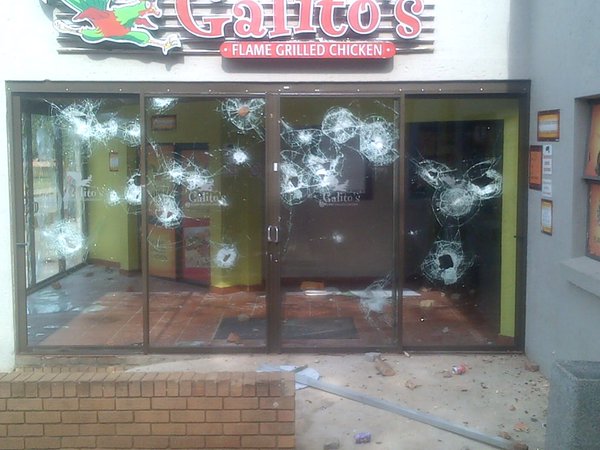 Looting: a fine beginning for the struggle against the colonial occupation of the commodity — but only a beginning
Looting: a fine beginning for the struggle against the colonial occupation of the commodity — but only a beginning
…more here “Students went on rampage and vandalised six cafeterias and national outlet restaurant after the institution said it could not commit to their demands for free education. The university remains closed. The students vented their anger on buildings, including security guards rooms at the Turfloop campus in Mankweng east of Polokwane. Student leaders told the principal and vice-chancellor Prof Mahlo Mokgalong that because he failed to make any assurances that the university will provide free education and write-off historic debts the institution “will be ungovernable”.”
…Gauteng: students threaten property rental company…Pretoria: students in the streets “A few hundred students took to the streets of Pretoria on Tuesday afternoon as part of the #FeesMustFall protest. Not satisfied with a government concession to keep university fees unchanged next year, they demanded that such fees be scrapped altogether.”… Western Cape: residents barricade major road with shipping container “Protesters blocked the main road with a shipping container, while on Monday they had used boats and a caravan.”
On The Economic Freedom Fighters (EFF)
…Johannesburg: after workers join march led by millionaire demagogue… EFF make their bid for best political recuperator of rising movement by occupying precinct outside the stock exchange with 40,000 demonstrators
SK writes:
The EFF are the South African version of Syriza and Podemos. Due to the conditions here our version adopts a militant leftist form that is archaic almost everywhere else. They may bark a lot about nationalisation and so on now but I’m almost 100% sure that should they ever come to power they will, as was the case in Greece, rapidly tone down the rhetoric in the name of realism. Like these other parties they have a presence in many real social movements such as land occupations, the latest student protests, and the miners strikes, all of which enhances their prestige and contributes to their popularity in the polls and on the streets. But this should not be over-estimated. They are a long way from being able to play the role the Communist Party in Italy, France and Portugal did in containing the revolutionary struggles of the 1960s/70s. In Marikana: A View From the Mountain the interview recounts how Malema contributed to the strike wave through his prestige and a small amount of material support, resulting in an exchange with a miner where he asks whether the workers considered the EFF as opportunists. “Yes. We know they are using us, but we are also using them.” This situation, of course, can and will change.
“The country’s first mass-popular political party of the left, the “Marxist-Leninist-Fanonist” Economic Freedom Fighters (EFF), entered parliament in mid-2014 after less than a year in existence, bringing 6 percent of the national vote and unprecedented and thoroughly rambunctious energy to the torpid legislature. The twenty-eight EFF parliamentarians disrupted Zuma’s speeches by shouting “Pay back the money!,” reminding society of the $20 million in illegitimate public subsidies for the president’s rural mansion, and they repeatedly created chaos in the national and provincial legislatures. But in March and April, the EFF purged four high-profile dissidents opposed to the party’s alleged petty corruption. Soon thereafter, EFF “Commander in Chief” Julius Malema’s attempted reconciliation with tax authorities was sabotaged by the state, raising the likelihood he will be jailed over $1.5 million in payments he disputes (in the wake of Malema’s lucrative reign of “tenderpreneurship” deal-making during the time he led the ANC Youth League).
Despite these setbacks, exceptionally gripping protests against historic racial injustices merged, which reflect EFF influence in South Africa’s politics of symbolic drama. Upon entering parliament last year, Malema vowed that the prominent statue outside the building of South Africa’s first prime minister, Louis Botha, would have to fall. On March 11, radical student activist Chumani Maxwele carried human excrement from a porta-pottie in his home township of Khayelitsha to the elite University of Cape Town. He attracted a small crowd of supporters and press, and flung the crap at the dominating statue of Cecil Rhodes, the notorious late nineteenth-century colonist whose Table Mountain land bequest became the
university’s grounds. The solo protest soon won a wide swath of allies anxious to challenge durable white power there (for example, only five out of more than 200 professors are black South African, “African” in race, though the society is 80 percent African). As the full weight of Rhodes’s awful legacy was debated, university leaders on both the left and right were repeatedly humiliated, culminating in the statue’s removal to an undisclosed location within a month. The racial justice movement spread to universities in Johannesburg, Durban, and Grahamstown (whose “Rhodes University” needs a name change); there were soon acts of apartheid-statue desecration in other cities, followed by a rise in high-profile land invasions coordinated by the EFF.” ( here )
SK writes, re. the above: — a good indication of just how archaic leftism is in this country. The fact that the leadership of the country’s major union, a bunch of unreformed marxist-leninists bending over backward to appeal to their comrades in the official communist party from which they were expelled, are attempting to form a workers party in a united left front with a bunch of other marxist-leninists, would appear severely outdated even in Cuba these days! As such there is literally no such thing as an ultra-left, and everybody now knows the superlative poverty of what passes for anarchism here; none of which is a bad thing as far as the real movement goes, in fact the delusional pre-historicism of these sub-bolshevik fossils makes the threat of co-optation from the left that much less likely.
It occurred to me that it wouldn’t be impossible to imagine Malema adopting the role of Hugo Chavez and really having a go at instituting a proper social-democratic regime complete with nationalisations of major mineral resources. The Latin American leftists of recent years have demonstrated the success of this move in seizing power at the polls whilst co-opting social contestation in the streets, and I remember an article by the EFF former ideologue in chief, Andile Mngxitama, discussing Evo Morales and his chums in Venezuela and Cuba.
SamFanto writes: I suspect that only if international capitalist interests are seriously threatened by a social revolution in South Africa that such a form of recuperation could develop. At present, neoliberalism would not allow the EFF to come to power with such a Chavez-like nationalisation project and would do all it could to sabotage such a possibility. The comparison with Syriza is far more likely, if ever the EFF had a genuine chance of being elected. South Africa is far more integral to international capital than Venezuela.
On Student Poverty, South Africa-style
Re. graduate unemployment in SA: it remains fairly low, at about 5%. This is fairly low, given the fact that unemployment generally is officially 25.5.% at the moment (ranging between 21.5% and 31.2% this century). “Joubert dispels the myth of graduate unemployment in South Africa, concluding that in South Africa only about a 100,000 graduates out of two million are unemployed at any given stage.” ( here ) Another study which confirms this says “the available data do not allow us to assess the nature of the work that graduates do. We cannot tell if it matches their qualifications; we do not know what it pays, etc. But we know from other research that real wages of skilled employees rose between 1995 and 2005 even as wages of unskilled and semi-skilled workers more or less stagnated, so new graduates appear to have entered the labour market at a particularly propitious time.” ( here )
A very interesting essay written by Charles Van Onselen in the late 1990s demonstrates the depth of the current student unrest and also offers a useful historical perspective on the often highly abstract and ideological “process of ‘transformation’ in higher learning. At first blush this programme of transformation – which reflects some undeniable political, social and cultural forces at work in contemporary society – has more in it to laud than to lament. It is precisely because of these underlying realities that most of us have come to adopt its ultimate goal as a broadly desirable educational outcome, and come to confine our criticism as not to the ends it seeks to reach, but to the means that are used to achieve it. For most South African citizens it is not the goal of transformation itself that is at issue, but the questionable means that an often angry and impatient generation of student activists uses to achieve its objectives. But even such public criticism there is, is often muted – more in sorrow than in anger – precisely because the underlying notion is that much of the activity is directed towards a desirable educational outcome. Thus, most of the criticism is based on the assumption that what we are currently confronted with are simply local manifestations of age old methods of student protests and riot, and that if it were not for the impatience of youth which often takes on anti-social forms and a lamentable shortfall in state financial resources, the instability in South African tertiary education would probably fall within broadly acceptable parameters.
We may, however, need to abandon these conventional wisdoms and try to see the problems in a slightly different way. In particular we have to examine three propositions that flow from adopting a slightly longer term historical and sociological perspective and a much closer analysis of the forms of the supposedly ‘antisocial’ behaviour that current student unrest takes. One, that what we are currently witnessing is not so much a classical manifestation of ‘student unrest’ released by unrealistic expectations coming in the wake of a largely peaceful and successful political revolution, but an insistent plea for the alleviation of acute rural (and urban) poverty and distress via a youth cohort that is acutely aware of its responsibilities to the extended family, and which senses that it can most readily articulate its demands in educational rather than social terms. Two, that in accommodating economic demands that seem to come from ordinary students struggling to survive in the tertiary sector, but which in reality derive more from a youth cohort deeply scarred by the ravages of apartheid schooling and poverty, the current government is in danger of confusing its welfare and educational responsibilities to the detriment of both. Three, that seen in this light, the current disturbances in the tertiary education sector are both less irrational and less ‘anti-social’ than they seem. Nevertheless, the short term and short sighted accommodation of problems that appear to manifest themselves primarily as ‘student’ demands, might also hold longer term political and even potentially revolutionary consequences for society as a whole…
Viewed from this perspective it becomes easier to understand why it is that many young black South Africans see access to a college of education, a technikon or a university as assuming an importance that far transcends the intrinsic value that can be attached to a tertiary education qualification per se. And why it is that many are willing literally to fight for the right to enter and stay in the sector regardless of how well or how badly they have been prepared for it by their secondary schooling. For thousands of black South Africans, access to tertiary education has become the difference between having a roof over your head and being homeless, between being fed for a part of the year or starving, between owning some clothing or being decked out in rags, and between meeting your social commitments by sending home small amounts of cash to your family, or joining the ranks of those who are fully unemployed. In the absence of universal conscription to the armed forces, significant youth employment schemes or the dole, much of the tertiary education sector becomes, in effect, a sponge which the state – perhaps unwittingly – uses to absorb thousands of unemployed youth who still seethe with a revolutionary anger that derives from the injustices of the recent past… Seen from this perspective it is easier to understand why it is that the process of student admission and re-admission is so often accompanied by violence, why there is a populist tendency to exert pressure downward on academic standards (pass one, pass all), and why all exclusionary processes – but more especially those involving so-called ‘financial exclusions’ – are vulnerable to challenge by riot.”
A recent article points out how these conditions might contribute toward determining the peculiar timing of the uprising: ‘Normally on university campuses it is very difficult to whip up much in the way of student activism on the eve of crucial exams – everyone is too frantically focused on revision. Yet the current wave of protest erupted in late October, just on the eve of exams. However, Blade Nzimande has been pushing many hundreds of thousands of extra students into the universities. Even before he did this, the failure rates among poorer black students were horribly high because their school education had been so deficient. By definition, the extra students now pushed in will be weaker still. In other words, there will be very large numbers of students on all campuses who, by October, know they are virtually certain to fail and thus be excluded. To which, of course, one has to add those who have already exhausted their bursaries and loans – with some of their fees still unpaid. All of these students were, by October, living under the lengthening shadow of exclusion. At this point – amazingly – university managements decided to announce their double digit fee increases for 2016. Had they left their announcements until December, nothing would have happened.’
The same article discusses the implications of the student movement in terms of political-economy: “The big event of the year from an analyst’s point of view was obviously going to be the settlement of the pay dispute with the public service workers. Over and over again the IMF and the ratings agencies had questioned whether the government really had the backbone to stand up against this, the bureaucratic bourgeoisie, of which government is part. The answer was a resounding No. In the same quarter that South Africa’s economic growth went into reverse at -1.3%, the public service workers got a settlement variously reckoned at 10.1% to 11.5%…This was already quite fantastical but it now emerged that neither the President nor the Minister had the slightest idea as to where the money was coming for to pay for the 0% increase, the cost of which was variously estimated at between R2.7 and R4.2 billion… As an analyst what you couldn’t help notice was that every rule of rational or even merely legal decision-making had been broken. Everything was up for grabs and the only real rule was that the government could not withstand determined pressure from any direction. It had given in to the public service workers despite the already widely forecast danger that this could cause another ratings downgrade. And now it gave in to the students with no idea where the money was coming from.” [SK]
26/10/15:
Greece, Athens: anarchists occupy HQ of right-wing party (in coalition with Syriza)
Argentina, Córdoba : police repression of protest against cop killing In a very poor area of Córdoba, police heavily repressed and arrested people involved in protest the same day against the police murder of a young man. A social militant called Ángel Verón was also killed by police this month [Pi].
Colombia, Tumaco (Narino): 2nd night of riots following election “After the riots, leaving economic losses, members of the Marine Corps and the police kept the situation under public order control . However, traders decided not to open their businesses for fear of new riots or of becoming victims of looting. The violent events of Sunday night and Monday left the windows of the Registrar destroyed, damage to the facilities of the RCN radio station and of the television channel CNC and the incineration of the vehicle owned by the elected mayor Emilsen Angulo. Finally, at press time, the Tumaqueñas authorities indicated that in order to preserve public order, an indefinite curfew from 9:00 pm would be decreed.”…
France, Yvelines: cops ambushed by a dozen youths outside Lidl; cop car window smashed “During a foot patrol of the area, the police discovered some heaps of stones, amassed in several parts of the district”
Mexico, Chihuahua State : local activists organize blockade of cross-border bridge for 12 hours, clashes with police reported Several independent or leftist organizations participated (including people organized against femicides, fracking, a mining project, ex-workers of local “maquiladoras” who were sacked for trying to create an independant union, farmers asking for justice for some of their comrades who were killed). Pretty interesting, as it gives information on what’s happening in northern Mexico’s Chihuahua State, one of the country’s deadliest narco-states, in which local struggles suffer horrendous repression and go largely unreported [Pi].
South Africa, Western Cape: 100s of students occupy university’s Life Science centre “Some of the demands… included that all student debts be scrapped, that no students be prevented from graduating because of outstanding fees and that students should not pay any registration fees. Other demands included that students be able to register for the entire year in January instead of every semester, and that the university starts a process of buying houses in the surrounding community and make them UWC communes. Student leader Kamva Rubulana said that the president’s announcement of the zero percent fee increment meant nothing to the students as they were not fighting for the zero percent increment but for the fall of all fees….“The only way we can stop this shut down is if the debt problem of UWC students can be resolved”….UCT students and workers in demo against outsourcing…Gauteng: as Wits management try to persuade students to stop their movement with nice promises…Wits Senate House is occupied, forcing adjournment of directors’ meeting There’s an element of demagogic cliche here, coming from the dreadful EFF: “This university is under new management now, it is the students that are in charge … this is the struggle we will fight until we win”…North West: rubber bullets fired at students blocking road…list of universities that remain closed…Eastern Cape: Hundreds of students broke into a bookstore and looted study material worth thousands of rands at Fort Hare University “the students had been trying since last week to break into the bookstore and on Monday morning they also looted a Coca-Cola truck driving on the main road.” …Western Cape: vigilante riots continue “…residents pushed a container on to Kommetjie Road and then set it alight while police in riot gear faced off against a crowd of hundreds of angry people. A tense calm hung over the area this morning and Kommetjie Road was reopened for traffic. Tyres were still burning inside Masiphumelele itself.”
25/10/15:
Colombia, San Angel (Magdalena): mayor’s house looted and ransacked after Town Hall is attacked, following elections…La Sierra (Cauca): Registrar and its furniture burnt after election result…Smiti (Bolivar): mayor attacked, town hall and registrar ransacked, official vehicle burnt after elections…Mapiripan(Meta): town hall and registrar torched after election results
South Africa: as some universities remain closed…many students declare that the victory is phoney “We’ve won nothing. The Fees Must Fall movement has a list of 10 demands. The president has only addressed one of them, and at the most strategic time. We have not been addressed on the neo-slavery that is the outsourcing of workers, the potential for free education in this country, the radical decolonisation of education, nor on the actions taken against our comrades who put their bodies on the line and now face charges against them. … Zero percent is an attempt to derail student protests by giving us a crumb when we’ve asked for the loaf of bread. Zero percent was given in order to reduce our numbers because it is a loss wearing the crown of victory. We reject this so-called deal with Zuma. We reject it because we must ask how this deal was made. Those who were allowed to make decisions on behalf of protesters across the country, without consulting the very students who they were supposed to be the mouthpieces of, while the real leaders of this movement were with the people on the streets. The issues raised by the Fees Must Fall movement are not up for debate or deliberation; most certainly not in a comfortable room while students are being tear-gassed right outside. What about the workers? “
SK writes:
I have not bothered to attend the meetings. From what I hear regarding the form these tend to take, and the narrow scope of the agenda, there would have been little point in doing so. If the movement continues and there is a significant occupation it would be more proper. Like me, one woman has simply distanced themselves from the idiotic leaders, saying she will attend demonstrations but no longer willing to participate in meetings and occupations where the atmosphere is simply intolerable. Others have formed their own caucus under the hashtag ‘#patriarchymustfall’ but this seems altogether ineffectual as practically none of their aims and methods are reflected in the broader movement at all. As I say this may be a particular UCT thing as the most prominent (largely media-appointed) ‘leader’ is a woman from Wits. There is also this:
according to two students who spoke to BDlive on condition of anonymity…
“Rhodes Must Fall” was attempting to appropriate the movement as their own through intimidation and hyper-masculinity… the unelected group purported to be the de facto representatives of black students and labelled any black students who did not support them or their tactics as “liberal sell-outs”, the students said. “There are instances where these leaders have intimidated female leaders in meetings with university leadership. Honestly, students are going to protest with whoever is protesting at this point. Most of them won’t question what is happening but marches have been disorganised in some instances where students have waited to hear from the vice-chancellor and he is suddenly not given a chance to speak” –
http://www.bdlive.co.za/national/education/2015/10/25/rabble-rousing-rhodes-must-fall-a-rogue-group-say-students .But as far as I know, the majority of women, as the majority of men, are
fairly indifferent to all of this, ‘protesting with whoever is protesting’
in the passive form generally prevalent in these sorts of things. A few
enthusiastically go along with the macho blacker than thou bullshit and
earn a place at the table for themselves, Margaret Thatcher-style. The rest
either withdraw in disgust or participate ‘critically’ which means pretty
much as passively as all the rest but with a few protests against the most
blatantly objectionable bits.“Wha’ abou’ the workers?” Well, this whole insourcing demand also seems a
pretty chimerical goal. After all that has transpired over the course of
working class struggle around the world, the idea that a change of bosses
is the answer to our problems is not merely a bad joke, it’s an insult.
This is more backward than even the bureaucrats of the postal workers union
who, during the massive wildcat strike earlier this year which the union
helped to defeat (as unions do), said “The current shenanigans happening at
the SA Post Office are a confirmation of the fact that nationalisation
without workers’ control and input is meaningless and unsustainable.”As for the rest of the 10 demands which were sidelined in favour of the fee
freeze, what were they? I certainly haven’t heard anything on the ground.
Probably dropping of charges for any arrested during the movement, which
seems to have been done for some already. Some others are listed in a
communique from the University of Pretoria (Tshwane – available here
http://www.thedailyvox.co.za/feesmustfall-forecast-for-monday-shutdown-in-some-parts-of-the-country-continues/)
which also gives some sense of how few share the radical sentiments of that
impressively eloquent newspaper article. 2 days after 20 thousand students
marched to the union buildings, an open planning meeting on Sunday was attended by a few hundred students.Many students expressed concerns about a continuing protest hindering their academic progress. Other students however insist that the protest continue, acknowledging that the issues of outsourcing of workers and free education were not brought up.
The fact that the meeting itself was so small itself speaks volumes. Even
more revealing is the fact that on the very same day “thousands more” signed
a petition demanding that the protests cease:President Jacob Zuma’s “no university fee increase for 2016” announcement
appears to have divided some universities about whether to resume classes. Wits University will remain closed on Monday… Many who had previously supported the Fees Must Fall campaign have began expressing dissatisfaction that the institution would probably remain closed on Monday. A third year mechanical engineering student Saieshan Vandayar began a petition asking that the protests be halted. He asks “Shaeera Kalla, the SRC president, to call off the protests on campus and ask her followers to resume preparing for exams so that the final week of lectures may be presented, and exams can run their course without further disruption,” Vandayar said. By Sunday night, more than 3 200 students had signed the petition. Many students also took to Twitter asking the SRC to allow them to write their exams.
At UCT the students seem not to be interested in doing anything further,
according to the daily vox, other than pledging to act in solidarity should
workers decide to strike. Nevertheless, many remain adamant that nothing is
over yet, for example those at North West University –
http://www.sabc.co.za/news/a/1e37fa004a5632d5880bdb6d39fe9e0c/North-West-University-joins-fray-to-continue-protesting-20151025
…KwaZulu Natal: residents blockade noisy truck company at 3a.m. demanding the right to sleep
Bahrain, Sanabis: cops attacked with molotovs, iron bars and rocks
Eire, Dublin: showhouse occupied by anti-austerity activists with boringly printed banner
24/10/15:
France, Finistere: confrontations with cops outside tear gas & rubber bullet factory on anniversary of death of Remi Fraisse (videos)…apparently this is the 3rd day of clashes
Life against his death
These actions are similar to those in the counter-summits (gatherings involving different “radical left” and anti-autoritarian groups and individuals) and are the result of the “Disarm the police” callout, which includes the idea of “blocking economic flows” made popular by the Invisible Committee in “To our friends” (several good critiques of the book are available on the net, for example this one: http://www.brooklynrail.org/2015/06/field-notes/since-the-end-of-the-movement-of-the-squares-the-return-of-the-invisible-committee). The “Disarm the police” slogan is rather problematic, as it sets an objective or a demand that is of course impossible to reach through anti-authoritarian ways (considering that setting demands is even a good strategy, which implies the necessary critique of demands). It can also be a simple slogan, but it doesn’t make the affair less demagogic: how could one possibly believe that police can be disarmed without completely suppressing it, and that it can be suppressed without getting rid of the system of which it is a consequence and one of the essential tools ?
There would be a few more points to criticize, for example the falsely naïve idea that the media can be “used”…but these developments can be made later through discussions, etc. [Pi]
SamFanto note: it seems necessary to distinguish between demands which are realistically achievable within the system (for example, some wage demands, no hikes in student fees, etc.) and impossible demands, usually intended to draw people in so that later they are meant to see that such demands cannot be realised without a revolution. The latter tactic is classic Leninism – hide the truth as you see it in order to reveal it later, an ideological separation of means and ends which in reality does not exist, so political manipulation in fact becomes an end in itself. As for “Disarm the Police”, in the UK, for the most part, since the establishment of the police in the UK in 1829 up until the late 1970s, the police have not been armed on a day-to-day basis (ie they used guns only in a situation they considered required them – eg in order to arrest armed people) – though nowadays apparently about 25% of the cops in the cities carry guns, but they’re hidden; so the slogan/”demand” “disarm the police” would have been kind of meaningless in the UK up until the last 30 years or so and would hardly have meant a lessening of their brutality. However, I feel that Pi is taking this slogan “Disarm the police” too literally – it doesn’t even feature as a demand in the text cited, and is only the title of the blog/organisation that wrote it and initiated the demonstrations against the NobelSport arms factory. As far as I can see, their “weekend of action against police arms” didn’t raise any precise slogan.
Essonne: motorway exit blocked as youths and cops clash (no context provided here)…Hauts-de-Seine: 20 youths attack cop patrol…Ardennes: cop car attacked with stones in afternoon…Oise: after arrest of young man, firemen ambushed, molotovs thrown, firetruck burns
UK, London: demonstrators supporting migrants break through cop lines to storm Eurostar terminal (anarchist report here)
South Africa, Grahamstown: looters go door to door selling stolen goods. This follows three days of unrest beginning on Wednesday during which more than 300 shops were looted and 500 ‘foreign’ shopkeepers were displaced along with their families. “In recent months six bodies have been found in open ground, five of them women. The women were found naked and had been raped. One of the bodies had been mutilated. The police do not suspect a serial killer. There was also an attempted rape at the Engen garage in Beaufort Street. People have been scared and rumours have been running high. The rumours have said that all the bodies were mutilated, that more bodies have been found and have blamed the murders on a shopkeeper from Pakistan. It was rumoured that body parts were being stored in his fridge. All the men that attempted to rape the woman at the Engen Garage were South African but it was rumoured that they had been sent by this same man. People started to speak of what they believed was a serial killer as ‘an Arab’, a ‘man with a beard’. They then started to blame all the Muslim shopkeepers including people from Bangladesh, Ethiopia and Somalia.” (Statement from Unemployed People’s Movement) Following the hype surrounding the student movement (which, though severely limited, is certainly a breath of fresh wind to be extended into more lowly areas where its best aspects are desperately needed), a reality-check regarding the nightmarish everyday existence among the poor majority and the hallucinatory fear and paranoia this routinely produces. The problem with this sort of thing is not that looting is, by adversely affecting petit-bourgeois family-businesses, giving a raw deal to ‘the little guy just trying to get by’, but, rather, that it is an attack directed against the nationality/ethnicity of the proprietor rather than against the commodity s/he serves and protects. Such misdirected anger all too easily leads to the bouts of small-scale ethnic cleansing that periodically sweep through the country, and that only reinforce the system of oppression that force South Africans into such vicious desperation in the first place — as evidenced by the militarisation of policing that followed the most recent attacks on ‘foreigners’ under the name of Operation Fiela, an ominous process whose ultimate result can be previewed in the unprecedented hell of the Mexican ‘war on drugs’. As the UPM statement concludes, ‘If unemployed young men chase a man from Pakistan out of Grahamstown they will still be unemployed and poor the next day.’ [SK][much of this is from an email, which is why there’s no link]…This demonstrates very well the isolation of present struggles in the townships and how this can lead not merely to repression by the forces of law and order but inter-communal violence.
23/10/15:
South Africa, Pretoria: as thousands clash with cops over student fee hikes (video)….President Zuma backs down on these hikes for at least a year More here “The use of stun grenades is believed to have fuelled violent reaction from students….A nyala with barbed wire was brought in, together with a water tanker. Students gained entry into the barricaded area and dragged the barbed wire away. Police fired rubber bullets and tear gas into the crowd, after which most of the students began to disperse….Earlier some protesting students lit fires on the lawns of the Union Buildings and turned away State Security Minister David Mahlobo. While dark clouds of smoke enveloped the protesters, Mahlobo emerged from a high-level meeting, chaired by President Jacob Zuma inside the Union Buildings. He strode towards the protesters on the lawns, accompanied by deputy higher education Minister Mduduzi Manana and several bodyguards. They were forced to flee after students threw several objects at them, shouting and making hand signals.”And here “Police have thrown a few stun grenades at the students, but these failed to disperse the crowd. The students, meanwhile, have set tyres and portable toilets on fire and pulled down a fence. Police used water cannon to douse the fires.”
burnin’ and looin’
And here “Student protesters had to run for cover as police used rubber bullets and tear gas to disperse them from the lawns of the Union Buildings. …The crowd ran for cover as a wave of riot police slowly advanced through the lawns. Students then regrouped and small pockets of them retaliated with a barrage of rocks and sticks.”
SK writes:
They have got what they wanted, but though fees have not increased neither have they fallen. It’s possible there will be a major push for abolition of fees altogether, and if so the struggle will obviously be far more difficult with major pressure to settle for a reasonable submission to a ‘long-term’ deliberately empty debate. For example Wits University has circulated a statement outlining the proposals vice-chancellors put forward at the meeting with Zuma and a bit more detail on what had been agreed. This includes ‘Long-term issues to be addressed include free education, institutional autonomy, racism, and what students call “black debt”.’
Of course at this rate the ideas of protagonists as to what is ‘reasonable’ change rapidly and I wouldn’t be shocked if enough among the thousands now mobilised have aquired the audacity and courage to take up the fight. On the other hand knowing the immensity of the obstacles facing victory I would also not be shocked if they pale before the prospect of a struggle that will certainly not lead to success within a mere matter of days, as has been the case so far, first with the Rhodes statue movement and now the fee increase. Knowing the huge amount of students that already struggle with the current fees there is certainly a mass basis for some move towards at least a significant reduction if not full abolition, but even this will place far more pressure on the state budget than the technocrats will allow without, I suspect, a far more serious fight than anything the students might hitherto have been willing to contemplate.
Whatever the case things can only get more interesting from now on
Some more promising signs: Firstly, the spread of looting during student protests from the University of Fort Hare yesterday (video here) to the Union Buildings at the capital today. From a detailed timeline of the day’s activities “17:20, PRETORIA Many students from Wits and UJ are still stuck in the city. There are reports of fires burning in the street, as groups of students – who some are claiming are from the Tshwane University of Technology – block roads, bang on the busses and loot alcohol and soft drinks from shops. Our reporter Pontsho Pilane has finally made it out of the city.” Secondly, the intolerance towards at least the most obviously opportunist politicians. From the same timeline: “12:26 CAPE TOWN News in now that police have had to escort the DA’s Helen Zille away from protestors after Stellenbosch students told her, in no uncertain terms, to “voetsek”. Zille is the latest in a long list of political figures to be seen by students as politically opportunistic and told to shove off.” Thirdly, the disruption of social space demonstrated by the road blockades described above, which also took place in Cape Town yesterday: ‘Students from CPUT marched off campus in their thousands in the middle of the afternoon, and were met by police on Darling Street near the Grand Parade. In scenes that had immediate echoes of the previous day, stun grenades were rapidly unleashed on protesters, sending the students scattering for cover before regrouping. A tense standoff with police ensued, with the cops barricading the top of the street and students advancing upon them, linking arms and singing.’ Later that same day I ran into a few hundred students inside the central railway station, and heard more of them one station down while I was travelling on the train. There seems to have been no attempt to blockade the train tracks, however, as is often done in France. Today a march to occupy the Cape Town airport [also here] in solidarity with the Pretoria demonstration was thwarted by riot police, though not without having ‘already caused rush-hour traffic mayhem‘. Interestingly ‘When a few protesters were informed that President Zuma had announced a zero percent fee increase, they replied “We don’t care,” intimating that they wanted a reduction in fees, and not just a zero percent increase.’ There are many other actions that have taken place over the last three days, too many to list here, but these are certainly among the most novel aspects of the present movement, that might be further developed with profit in the future. [SK]
According to this, ” Bus workers came out in solidarity and provided free transport to the demos”. And this (left-liberal) article reflects on how workers have been ignored in the media portrayal of this struggle: “Workers have marched side by side with students, and the marginalisation of their role is a reflection of their perceived value at UCT and in society. It is less comfortable for society to recognise the legitimacy of workers’ struggles.”….Cape Town: “Police must fall”…Pretoria: 2 cop cars set alight
cop car burning, Pretoria
Interesting comment here: “We were caught off guard by the speedy response of the government. We knew that the 0% would be granted, but we were expecting the announcement on Monday, not yesterday, so the letter of solidarity we had drafted became a bit irrelevant. I am working on another one with a friend which explains that the workers and students have always been in solidarity on this, and how the theory of decolonisation fits into this. There were always two demands 1) no fee increase and 2) end outsourcing of public institutions. It seemed the second one was drowned out after the events at parliament. The ANC has since tried to co-opt this movement by handing a victory to their youth league yesterday. They invited SASCO students (part of the ANC youth league) and students leaders from opposition partied to a meeting with the president to negotiate with them, even though this movement has been non-partisan and leaderless from the beginning. They then played the game of negotiating with their own lackies to make it seem as though it was their own youth league’s action which had brought this about. As far as I know, mainly men were invited to this negotiation, even though this movement was largely led by women. People on the ground are not happy about this, mainly because the movement has been misrepresented, it was always a grassroots one, and also because this settlement has left the workers behind. Another thing which seems to have gotten little attention is the level of violence on used on campuses of historically black/coloured universities. It has been much worse for them than it has been at the “more prestigious” formerly predominantly white ones such as, Wits, UCT, Stellenbosch and the University of Pretoria. The press has also given far less attention to historically black/coloured universities. When we, at UCT, marched on police stations and blocked main roads, there was plenty of press and the police were less aggressive. Our crowd had many white students in it marching with us, in a predominantly white neighbourhood. At UWC and CPUT, where the student body is largely black and coloured, exits to the university were blocked, and water cannons, tear gas, stun grenade and rubber bullets were used on them….”
Western Cape: 600+ residents obstruct roads, set two boats alight, throw rocks & stones at cops & journalists, set fire to cars & bus in fury over arrest of “leader” More here…Limpopo: miners stage illegal sit-in strike demanding dismissal of Human Resources manager and Employee Relations manager
France, Yvelines: cops ambushed, several cars burnt, municipal building damaged “It was at about 2:00 am when a first set of burning bins was reported…The officials who travelled to the scene then fell into a real trap: blocked by a supermarket trolley up the street … their vehicle windscreen stoned by a group of five individuals. The police were forced to use their defense bullets launcher and a disencirclement grenade to get out. At the same time, two fires were reported, in close proximity to municipal buildings: one by municipal workshops, … where three vehicles were on fire and…outside the Town Hall…where three other cars were set ablaze. The total balance of this night, which ended peacefully after these acts, amounted to twelve vehicles burned or damaged by stones thrown at the windows and bodywork, a wall of municipal workshops damaged by heat, a glass of a door of an annex of the Town Hall broken by a stone and three billboards damaged by fire.”
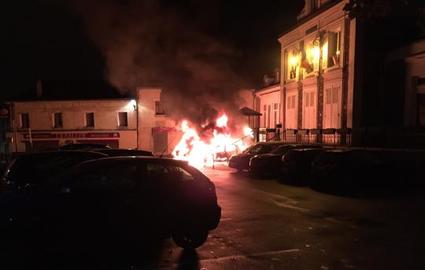
India, Delhi: “occupy” movement against withdrawal of fellowships attacked by cops
22/10/15:
Canada, Montreal: Mohawks block train tracks in movement against sewage dumping
South Africa, Grahamstown: protesters loot shops
France, Orne: mayor’s house and police station molotoved after adolescents are arrested for dealing cannabis The car carrying the teenagers was torched in order to eradicate any clues; later in the night, cops patrolling the area are stoned (literally).
Mexico, Michoacán: normalista school students & supporters react to threats from Governor to forbid further protests or actions in Michoacán by seizing the Secretariat of Public Education building in state’s capital and blocking roads “About 100 students accompanied by 400 more people arrived in Morelia, stationed themselves in the state Department of Education and evicted the staff….On at least two occasions so far this week, the governor warned it would not allow more blockades by normalistas. But on Wednesday, protesters took at least five toll booths …Approximately 500 students, some of them masked and armed with sticks, arrived in Morelia on board at least five buses and blocked the Madero Avenue …Another group decided on Ventura Avenue Bridge, opposite to the Ministry of Finance, where they blocked traffic.”...Nahuatzen villagers expel local mayor, accused along with his Security Director of being part of the Caballeros Templarios (Knights Templar) cartel
US, New York state: anti-military graffiti on Vietnam Memorial
Morocco, Rabat: cops violently repress students on 50th day of medical students’ strike and sit-in, protesting the draft law of compulsory health service “the choice of the faculty of Rabat is not innocent: it is the weakest link in relation to other establishments on strike for 50 days. In the capital the students did not have the support of their teachers who continue to teach courses even if the level of attendance is very low. “…This use of strong-arm tactics punctuates several weeks of tension between the Ministry of Health and the National Coordination of medical students in Morocco. The government thus intends to break up the protest movement, which continues to grow. Launched on July 23 with the holding of a successful sit-in outside the headquarters of the Ministry of Health, two weeks later, the coordination called for a boycott of classes in the faculties of Rabat, Fez, Oujda, Marrakech and Casablanca.”
21/10/15:
Belgium: prime minister’s convoy rammed by “anarchist”
South Africa, Cape Town: students clash with cops as they try to storm parliament after parliamentary complex is occupied; stun grenades used Videos here & here. SK writes: They mobbed the manager of the security contractor on campus to let the workers join them at full pay. Not sure how that actually turned out — did the workers even want to join them? — but it’s an interesting new tactic.
Cape Town: students push open gate to parliament’s precinct
…Gauteng, Pretoria: students block main road as part of fees protests…Limpopo: shops and banks close as students hurl stones at cops… List of universities affected here:
• University of Free State
• University of Limpopo
• University of Fort Hare
• Nelson Mandela Metropolitan University
• University of the Witwatersrand
• University of Cape Town
• Eastcape Midlands College (Grahamstown)
• The University currently known as Rhodes
• Central University of Technology
• Cape Peninsula University of Technology
• University of Western Cape
• All 11 Agricultural Colleges in South Africa
• Walter Sisulu University (Buffalo City Campus and Umtata Campus)
• Tshwane University of Technology
• University of Pretoria
• North West University (Potchefstroom campus)
• University of Stellenbosch
Mexico, Michocan: normalista school students close 8 normalista schools to protest against decision to have entrance exams… 5 highway tolls taken over, several buses seized as part of this movement…Durango: gold mine blockaded
Dominican Republic, Bonao: riot at demo demanding state-subsidised work “Violent clashes between protesters and police took place tonight in the centre of this city, causing the closure of several supermarkets and of Duarte Avenue as a preventive measure against possible attacks. The Broad Front of Popular Struggle (FALP) and the Popular Movement and community organizations (MOPC)… blamed the government for the actions undertaken by not meeting the demands of the people . …Demands were for the construction of a new hospital for Bonao, the relaunch of the Caracol Industrial Zone under the Villa Liberation sewage systems and Palmarito, paved streets, avenues and construction of the Caribbean Gingers road among other things. Heavy gunfire between protesters and police caused panic …Bonao Ray supermarket and shop furniture stores…were surprised by the unscrupulous who waged war with stones against such establishments. The action was repelled by police who fired shotgun shells and tear gas to disperse the attackers.”
Congo, Brazzaville: barricades and burning tyres against constitutional change
US, Vermont: Bring Me The Head Of Ronald Macdonald
20/10/15:
France, Isere: travellers politely request temporary release from prison of man to be able to go to his brother’s funeral; simultaneous riot in prison “A hundred people with iron bars blocked the station. Around it, there was heavy looting, including the restaurant attached to the station ….. The RD1085 [a major road] at Moirans was blocked “by about thirty people burning pallets and wrecked cars on the road….Traffic remained cut off for hours. At the station, a burning vehicle on the tracks interrupted traffic….” Representatives of the Travellers, settled in Moiran, were negotiating with their lawyer and judge … to ask the brother… of a victim of a road accident that occurred this weekend so he can “attend the funeral to be held on Wednesday,” …But “justice seems to refuse to accede to their request.” “Their lawyer appealed the decision. Having no response…at 4:01 p.m. the standoff began” on the RD 1085… where having plundered the neighbouring breakers’ yard, they blocked the road and then set fire to vehicles, …..A mutiny also erupted in the detention center of Aiton (Savoie) where the young man is incarcerated.”
leaves on the line?
Moirans, Isere
“…some 100 travelers stormed the company and assaulted the enterprise’s boss. …Roma almost stormed the city hall building, from which all workers had to be evacuated. The schools of the city were under siege, too, and the administration wouldn’t let the students outside….At the same time, a mutiny broke out in the prison of Aiton in Savoy, where the inmate in question is kept. Twenty prisoners set fire to their corridor and destroyed the locks of their cells….No one has been injured in the clashes.” – from here
South Africa, Gauteng: Wits medical school occupied ““You can jail a revolutionary, but you cannot jail a revolution.”… Video…More here – unfortunately dominated by an elitist slogan: “Students are SA’s future.”
Keeping your Wits: over-optimistic slogan…?
….Cape Town: university entrance barricaded with burning tyres…Shoprite store occupied by protesters demanding reduction in price of bread
Italy, Bologna: massive resistance to squat eviction
Congo, Brazzaville: heavy lethal confrontations between demonstrators and cops, unfortunately dominated by constitutional-political considerations “…demonstrators burned tires and barricaded roads. Gunfire rang out and businesses closed in the oil-rich nation, and telephone and Internet lines stopped working by Tuesday afternoon. Protesters said police shot and killed at least four people”
19/10/15:
US, North Carolina: “kill a cop, save a child”
South Africa, Gauteng: wildcat bus drivers’ strike….Eastern Cape: students block all roads to university in movement against high fees…Western Cape: university of Cape Town shut down…also at Stellenbosch, Fort Hare, and Pretoria unis… and Wits
makeshift barricades at Cape Town university
SK writes:
The student movement could indeed get more interesting, but right now that
possibility is the only thing it has going for it. It is a movement and it
has moved from symbolic protest over symbols to material protest over
material interests. That said nowhere are they demanding more than the
ability to achieve cadre roles within the economy “on the cheap”, along
with a smattering of militant workerism and a great deal of racially crude
ideological bluster.Locally, for example, the women I spoke to all reported that idea that
‘blackness is more important than confronting macho patriarchal relations’
is widely held and practically reflected in everyday life. Yesterday I was
at the UCT strike and it was almost as lame as the last time I encountered
them. They made a big deal over successfully storming the administration
building only to abandon it moments later because nobody actually knew what
to do with it. In other places like Wits the current protests seem to be a
genuine reflection of anger among the majority of the student body whereas
at UCT it seems to be largely ideological bandwagon hopping despite the
fact that it is a ‘bread and butter’ demand — partially because after the
rapid success of the Rhodes statue removal students really didn’t know
what to do with themselves and interest dwindled, leading to the current
exhaustion, partially due to the ideological nature of the activists
(buildings being renamed after ANC icons like Winnie Mandela and Solomon
Mahlangu, toleration and even dominance of political parties and sects)
that rightly repels many people wary of political bullshit, partially
because the student body is probably more middle-class in Cape Town with
less people in desperate financial straits than elsewhere. The large
majority of people there just mill around and wait for those with
megaphones, who are always the same people, the leaders of this or that
sect, to provide unilateral information and instructions. There is no
question of confronting the role of the university in maintaining the
dominant misery of this world; even within the narrow world of student life
the demands and organisational forms are so remote from everyday life of
most that there is little incentive for the majority to actually
participate in anything other than passive ways. One woman who supported
what was happening explained why she didn’t have anything to do with it by
the fact that exam stress forced her to focus exclusively on her school
work, suggesting that those currently active in the campaigns were ‘good
students’ who could juggle their rebellious roles and their academic
studies. Another guy who’s involved in a collective based on Paolo Freire’s
‘pedagogy of the oppressed’ said that though some of his comrades are
students there is little interest amongst their fellows in questioning the
dominant pedagogy of the institution beyond the demand for more black
academics and more ‘black’ subjects.Other than greater numbers of participants and more effective use of
physical force, there have not been any signs that things are any different
anywhere else around the country — though I have no first hand accounts,
but certainly nothing interesting has cropped up in terms of stated demands
reported in the national media.
Niger, Niamey: students v cops, stones & burning tyres v tear gas etc. as students protest lousy study conditions “Two national guards and five policemen were injured by stone throwing – one seriously who was in intensive care in hospital,” Niamey governor Hamidou Garba told a press conference. He added that 79 protestors were arrested over the clashes in which two police vehicles were “ransacked” and another belonging to the French embassy’s communications officer was “set on fire”. The governor said two more vehicles from the UN refugee agency were damaged by protestors. “
UK, North Wales: cars of prison project manager attacked
18/10/15:
Montenegro, Podgorica: HQ of governing party and Telecom attacked by demonstrators; section of cops refuse to fight them (more in English)
Iran: report in French of strikes and protests in the country since the beginning of October “Worker protests continue to grow daily in Iran. The struggles of teachers in the last 10 days have been an example of these protests. On the occasion of the international day of teachers, teachers gathered in several cities and reiterated their demands, like the release of their imprisoned colleagues. Among the slogans of these assemblies, note “political prisoners must be released.” Teachers are also asking that their salaries rise beyond the poverty line. The government announced that the poverty line was set at 3 million Tomans. And this, while the salaries of teachers, workers, nurses, and large proportions of employees are well below it. Three years ago, a campaign for wage increases had collected the signatures of 40,000 workers. In addition, pensioners and nurses protested last year for wage increases. While these protests continue, the nationwide teachers’ protest has had a significant effect on the political space in many cities. And amongst these events, add several factories protesting against unpaid wages, layoffs, precarious contracts, etc.
– The workers of three important petrochemical centres in Arvand, Tondgooyan and Mah-Shahr were respectively on strike for 10 days, three days and two days. After a meeting on October 12 with the direction of the Holding Company of the Persian Gulf, these workers suspended their strike. They demand the establishment of a salary grid, a 30% increase in the minimum wage and 35% of the nighttime bonus for temporary workers. The workers announced that they would call a strike if the promises made to them are not kept.
– October 12, 105 redundant workers in the food complex Mirab gathered for the second consecutive day in front of the headquarters of the company. They ask for the return of their jobs and their unpaid wages.
– On October 12, the strike of the workers of the granulated Ardakan plant entered its fifth day. The strike began in protest against the poor quality of food in the canteen of the factory. Facing the scornful reaction of senior management and officers of the city, the workers met to decide to go on strike. They ask for good quality meals and wage increases.
– On 11 October, the strike of the iron and steel plant workers of Dorood entered its 23rd day. The workers claim payment of three and a half months of unpaid wages and guarantees for their jobs. In addition, contribution payments for the workers’ health insurance are also delayed, posing great problems for the workers when they seek treatment. Several premiums also were not paid. After 23 days on strike, the bosses promised to pay part of the sums due by the end of the week.
– On the morning of 11 October, 105 workers of the textile factory Parsilon in Lorestan province protested outside the headquarters of the Social Security in Tehran. This demonstration was organized to protest the questioning of their arduous premium for retirement.
– On October 11, the workers of the petrochemical complex Farabi observed for the 7th consecutive day a hunger strike during the lunch break. The workers are protesting against low pay and pay discrimination.
– On October 8 34 retired workers of Iran Confection Plant, gathered outside the offices of the Social Security in Tehran to denounce the delays in the payment of their retirement pensions. This is the third time that these retired workers have appeared. In retirement since August 28, 2014, they have not yet been paid their pensions.
– On October 8, teachers from the cities of Tehran, Saqqez, Sanandaj, Marivan, Hamedan, Mazandaran, Mashhad, Torbat-Heidarieh, Kermanshah, Ahvaz, Booshehr, Ghazvin, Rasht, Karaj, Delijan and many other cities organized rallies on the occasion of the international day of teachers. In Mashhad, the atmosphere was electric and teachers chanted slogans like “Teachers imprisoned must be released! “” Unity! unity! unity!”, “useless Minister! Resign! resign! “.
– On October 7, the 19th day of struggle, the workers of the iron and steel plant of Dorood demonstrated outside the governor’s office Dorood. After one hour, the government promised the payment of unpaid wages and contributions for health insurance. The workers decided to discuss at a meeting further movements if wages were not paid.
– On October 6, a group of teachers with precarious contracts in the school district of Ilam, in office for 6 years, demonstrated outside the district education office to obtain stable jobs.
– On October 5, a group of teachers of the Gilan province protested outside the office of the Ministry of Education in Rasht. Teachers have denounced discrimination, low wages and delays in payments of salaries. It should be noted that many women participated in the event.
– On 5 October, teachers in Tehran and other cities demonstrated outside the offices of the Ministry of Education, Palestine Square in Tehran. During this gathering, note the impassioned speech of Madame Pakravan, mother of political prisoner Reihaneh Jabbari executed by the Islamic regime. Among the slogans chanted: “Teachers imprisoned must be released! “” Teachers do not belong in jail! “” Teachers, workers, and students, unity, unity, unity! “. The event lasted from 10:00 to 12:00. The same day, similar meetings were held in Rasht, Hamedan and Ilam.
– On October 5, a group of teachers and retired teachers demonstrated outside the pension fund for retirement of the city of Bijar.
– On October 5, precarious city employees Majed-Soleyman gathered for the third consecutive day to protest against four months of unpaid wages. Under pressure from the protests, one month’s salary had been paid to them and the workers resumed work temporarily.
– On October 5, 200 kindergarten teachers under temporary contracts demonstrated for proper contracts. The terms of gender and qualifications to get tenure were denounced at the rally.
– On Oct. 5, 90 contractual teachers in nursery schools of Golestan province gathered outside the education office to ask for proper contracts. There are 1,500 contract teachers in the province.
– On 2 October, labor activists in the city of Karaj gathered to honor the memory of Shahrokh Zamani, militant worker died in custody Sunday, September 13, 2015.”
I put this here because, like many of the reports on the “News of Opposition” page, it provides information of things moving in countries which – partly because of media silence, partly because of their dictatorial nature – we have grown accustomed to assume nothing is happening. The events, and slogans around them, in themselves are not particularly “radical” but, given the difficulties facing those who dare to raise their heads above the parapet, they indicate an undercurrent of growing courage in the face of horrendous repression.
17/10/15:
Nicaragua, El Limon: cops heavily repress workers long-running stand-off against Canadian mine operators that don’t even respect minimal wage slavery rights The police took over the village, which had been controlled by miners and their local supporters for 15 days. 2 were arrested, and 2 cops injured. It seems the miners refused an offer by Catholic and evangelical church representatives to act as a mediator. Everything had started after 3 union leaders were fired illegally. A female villager declared (in El Nuevo Herald) that the village has historically been Sandinista, and that they’re now surprised to be repressed by a Sandinista government.
France, Corsica: football fans clash with cops, burn bank and bins…Montpellier: cops surrounded by 30 youths during control of car and stoned; 2 cop cars damaged This is a popular area of the city, where , despite enormous misery (drug dealing, decrepid housing, poverty, etc.) has still some semblance of community and solidarity, and constantly causes problems for the nice image of passive “calm” that the authorities wish to portray for the town. Which is why there are plans to move people out and turn the place into rubble.
16/10/15:
Mexico, Michoacán: indigenous “comuneros” of Carácuaro block federal police forces in their station after a local was arrested Pi writes: This happens in a zone infested by organized crime, which has seen a very large army operation to occupy several indigenous areas (those actively fighting against the cartels) in the last few days.
South Africa, Gauteng: student barricades after security guards tear gas students protesting fees increases…vice chancellor and executive council of uni locked in Senate House overnight by students “The students would not back down and demanded that top management hold a meeting and accede to their demand. Eventually, an agreement was signed on Saturday between the students and the council, led by its chairperson Dr Randall Carolissen. The parties agreed to suspend the 10.5 percent proposed tuition fee increase for 2016 and that the negotiations on fees start anew. They agreed that there would be no disciplinary action against students and workers who participated in the protests.”
15/10/15:
India, Karnataka: farmers smash up toll booths after minister belittles farmer suicides
Mexico, Guerrero: members of Guerrero state villages’ armed brigades march to army checkpoint to protest against insecurity, police & military abuses in their communities, and also ask for fertilizers Pi writes: Gives a good idea of how movements are commonly both armed and reformist in their demands, and shows some of the contradictions combative countryside residents are faced with in Mexico: reduced to fight against organized crime and the forces of order at the same time, they often ask the latter to “do their job”. Autonomy in the defense of local communities is often adopted as the last option, when no agreements are found with local institutions.
Guerrero villagers, armed for the 1st time during a protest
France, Limousin: cops ambushed, pelted with stones as bin burns; no arrests
Colombia, Medellin: students riot over changes to entrance exams; university evacuated; underground station smashed up a bit…Cali: riots after cops attack blockade of road by students in support of health workers’ movement against cuts
Bulgaria, border with Turkey: migrant killed by border guards during clash (no details given)
Switzerland, Zurich: cop hospitalised as 30 attack cops during ID control
Australia, Christmas Island: riot cops storm deportation centre…Sydney: Prime Minister’s office occupied by people demanding closure of asylum seeker detention centres…article about Australia’s youth detention centres (from 21st Oct.)…online comic about Villawood migrant detention centre
US, Colorado: dreadful disgusting desecration of holy shrine to police martyr-saint
14/10/15:
South Sudan, Rumbek: high school students riot over crap food, lack of teachers & electricity
Guinea, Conakry: barricades and stone-throwing – but mainly dominated by electoral considerations
US, Baltimore: activists occupy City Hall with reformist demands concerning cops…Virginia: conflict between protesters and supporters at Trump rally
13/10/15:
South Africa, Limpopo: 10 vehicles torched in protests over lack of jobs “The vehicles that were set alight had been driving along the R555 road between De Hoop dam and Burgersfort, when drivers were pulled off from their vehicles and ordered to run. Several could only stand by and watch from a short distance away as their cars went up in flames. On Wednesday, the majority of mine workers, many of whom reside far from their places of work, did not report for duty as there were no buses travelling on the route due to protests. “
China, Guangdong: further protests against waste incinerators; clashes with cops
Kenya, Maseno: clashes with cops after student dies in wake of razing of University admin block on 8th October…more here
Turkey, Istanbul: 2nd day of official general strike – clashes with cops; sit-in at hospital and Sirkeci district… Ankara: students sit-in at university…anarchist statement on bombing…interesting comments here (from Mikail Firtinaci) – “I am in Istanbul. There were practically no strike actions. Only a couple of small workshops that were already in some of form strike action recently showed solidarity. Beyond that nothing visible. In some cases police even attacked the funerals. Demos disbanded. In an international football game in konya (extremely conservative islamist town in central turkey which is practically a shit hole) crowds even booed during one minute long minute of silence to show respect for the fallen in Ankara. Total apathy. So practically mourning is not possible in Turkey. Only anger and organization for the total abolution of this f.cking murderous state are….
Political strikes, solidarity strikes, occupations, general strikes etc are all illegal according to the Turkish constitution. Workers are only allowed to strike in the process of collective bargaining and only if there emerges a conflict between unions and bosses. These collective bargainings take place between union federations and state & bosses on three yearly cycles. Even then strikes can only happen through a very complicated legal process and mostly top down. But make no mistake. Strikes are almost totally illegal but the union confederations are cherished and carefully protected under the state law. In fact after the last referendum in 2010 three main union confederations (Turk-IS (statist, centre), HAK-IS (islamist), DISK (leftist)) are granted constitutional status and carefully calculated legal adjustments are made so that their declining membership would not bar their legal standing as the official reps of workers.
However, of course class struggle in Turkey (as everywhere else) does not follow the constraints of legal barriers. Practically there are three types of strike actions, which are in conflict with each other, serving different class interests.
1 – Wildcat strikes. In the fashion Luxemburg described in mass strikes, wildcat strikes mostly emerge as the surfacing of a subterranean struggle that is always underway between the bosses and the workers in workplaces. In almost all wildcat strikes you see workers organizing themselves on the shop floor ingeniously calculating all the odds, and only in a couple of days pushing the bosses into a corner and wresting major gains. So most wildcat strikes -even though they are legally banned- win major victories with rarely (if ever) little losses. Recently not only their numbers rose but also their goals tended to be more sharply formulated. In metal sector in Bursa and Marmara region there were strike after strike and every factory took over the same list of demands which included the expulsion of the unions from the factory.
2- “Leftist” strikes. What I mean by a leftist strike is typically a strike caused by the miserable failure of leftists’ attempt at unionizing workplaces. In those cases, a bunch of leftists -mostly radical- enter a non-union factory, they organize some workers to join a legal union, and when they are uncovered the bosses sack them. Than they usually open a lawsuit for being illegally sacked while at the same time building a tent in front of the factory until the legal case is over. Usually the sacked unionized workers wait there day and night. These kind of “struggles” not only demoralize other workers and exhaust those in the “tent occupation” but also feed into a false belief in legalism and courts as the last resorts in struggle. They are actually not even strikes because they mainly break solidarity ties between the militant sacked workers and those who continue to work inside the shop. That way an image of struggle as a heroic act of martyrdom is sustained and the cause of collective class solidarity in action is undermined.
3- Unions’ (not so) “general strikes”. As it happened after the Ankara bombing, unions sometimes call fake general strikes. After the Gezi revolt and the Ankara bombing there were small strikes. However, only radical left “participate” in them and they are practically A to B marches, totally depressing and under constant police harassment. We can say basically the function of Turkish unions is not organize strikes but to suppress them and if possible limit political actions to leftist demos in central squares where the leftist Kurdish and Turkish youth is beaten by the police. So basically unions are total state functionaries channeling the combative spirit in a safe way to the hands of police…”
12/10/15:
Canada, Quebec: former indigenous-run police station burnt to the ground
Mexico, Ecatepec: communique of incendiary attack on car dealership…Guerrero: 500 locals block bridge to force local cops to leave municipality after several theft incidents by them…Tabasco: fights between teachers of CNTE blocking roads and riot police in 3 different parts of state
US, Detroit: Columbus gets makeover
Chile, Santiago: Mapuche Indians demonstrate against land theft on Columbus Day; rocks thrown at cops, national flag burnt Mapuche Indians are 4% of the population…church door set fire to (report of arrest & imprisonment, after cops had infiltrated this demo undercover )
Brazil, Teofilo Otoni: 14 prisoners escape during riot in which 3 prisoners are killed “The prisoners who rioted also damaged the wings where they are housed and set various objects on fire.” This article is by Fox News, so one can judge its version of events by the fact that it dares to state that Brazil ” has one quarter of the world’s prison population”. In fact, it has slightly more than ¼ of the US prison population which proportionate to the country’s total population is the highest in the world (see this ); the US has 560,000 more prisoners than China., with less than ¼ of China’s population. So when this article states “The state government said in a statement that the dead prisoners were murdered by their own cellmates” we know that that is the official version, which may or may not be correct.
Turkey: several universities on strike in protests following bombings…unions launch general strike
France: 4 arrested following last Monday’s fury at Air France…Macon: firefighters get stoned…Savoie: cops attacked with stones on estate
Greece, Athens: strikers on trial This article calls them “unionists”, but certainly not all (if any) of them have a position within the union.
11/10/15:
Iraqi Kurdistan: further developments in movement in Sulaymaniyah , Halabja and Garmiyan
Turkey, Ankara: mourners clash with cops after bombing …Diyarbakir: clashes with cops
10/10/15:
Mexico, Oaxaca: victory for “no mining” campaign
China, Guangdong: riot over incinerator ““How will we survive breathing in noxious smoke?” an employee of a small Internet firm told Reuters by telephone on Tuesday. “Yesterday night, the police have already beaten a lot of people, and arrested more,” added the woman….Photographs posted online…showed protesters pinning a police officer to the ground, and flames engulfing an overturned car. Three vehicles were damaged”
Iraqi Kurdistan: riots spread to 3 areas “Protests across Sulaymaniyah Province in the Iraqi Kurdistan Region continue to spread this Saturday, with furious protesters attacking and burning the offices of the ruling Kurdistan Democratic Party (KDP) throughout the province. On Saturday October 10th, protests began in Sulaymaniyah city center, with demonstrators attempting to attack KDP buildings. Security forces prevented the protesters from nearing the main KDP office, using tear gas to disperse the demonstrators. In the town of Said Sadiq, east of Sulaymaniyah, mostly teenage protesters attacked the KDP office with rocks. KDP supporters protected the office and responded by throwing rock back. …In Kalar town, located south of Sulaymaniyah, protesters also attacked a KDP office in the town with rocks…In Qaladiza town, north of Sulaymaniyah province, the site of Friday’s clashes in which three people were killed and 18 more injured, on Saturday protestors attacked another KDP office in the town and burnt it down. There are also reports of protests in Penjwin, near the Iranian border. In the last a few days, protests have spread across Sulaymaniyah province. Protestors claim to be angry at the delay of salaries and the presidential crisis, although most of the attacks have been directed at KDP buildings in the province.”
See also this from 1991 which talks about how the Kurdish nationalist parties often sided with Saddam Hussein. It should also be pointed out that in February to April 2011 demonstrations in Sulaymaniyah, in Iraqi Kurdistan led to a massive repression by the same political forces critiqued in the previously mentioned text. On this – largely unknown or, at least, forgotten – uprising, see also this report, and this post-repression assessment, when 10,000 troops occupied the Kurdish city.
India, Jaipur: roads blocked, cops pelted as teachers protest against elegibility test
Turkey, Istanbul: protesters clash with cops in working class area in wake of bombing Interesting comments here…here…here…and here
Thailand, Phuket: city lives up to its irresistibly jokey name “… residents surround police station & burn police vehicles after police truck chases & accidentally hits motorcycle that sped past police checkpoint, killing two two young men…About 300 angry residents laid siege to the Thalang police station in Phuket in what eventually turned into a riot on Saturday night with the crowd setting fire to a number of vehicles….The crowd smashed the glass in the police station and damaged the police station. The crowd then blocked the road in front of the police station with steel barriers andset up tents, completely closing down the flow of traffic to and from the town of Phuket….The siege of the police station by the protesters continued into the night and at about 10.30pm, 15 anti-riot police arrived to reinforce the 30-strong police force to protectthe police station. The protesters then poured gasoline on police vehicles parked in the area and set them on fire. Fire engines were called to put out the fire, but they could not break through thecordon of protesters to put out the fire. At least nine vehicles were completely destroyed by fire….The crowd finally dispersed at 3.30am in the morning after the military intervened and promised to arrange for talks between the relatives of the dead and the police. During the 15-hour siege, the protesters damaged the police station and set fire to nine vehicles. They also smashed and damaged 13 other cars and five motorcycles. Fourteen policemen reportedly suffered minor injuries in the incident.” More here
Pi writes: Knowing how the present Thai social structure is so well organized as to prevent and make almost impossible all forms of open and conscious rebellion, it’s always moving to see people expressing their anger in a pretty direct form, without (it seems), the usual numerous representatives (little chiefs at a local level, politicians and all kinds of mediators). Plus the two persons who were killed by the police didn’t seem to be high-level dealers: these are well protected by the police and never troubled in their activities, while very low-level sellers and consumers are often executed when politicians decide to launch new episodes of the war on drugs, a pretty popular concept in this Theravada Buddhist society. In 2003 it lead to about 2,500 extrajudicial killings. A few cases were brought to justice but not much happens usually. It’s even very common to see people “unwilling” to do anything after people in their family are killed or dissappear: these types of events are usually seen as fate and people try to forget about them to keep their sorrow deep inside. Especially because drugs are quite taboo, though of course heavily used among Thai people.
Kenya, Bondo: university closed after student riot; saloon car torched, cops attacked
Peru, Chiclayo: 5-hour protest in prison after 2 prisoners die, burnt alive by others
Germany, Stuttgart: clashes between Kurds and cops
9/10/15:
Iraqi Kurdistan, Qualadize: main political party offices torched in demo after week of strikes and protests…Sulaymaniyah: lots of journalists attacked
France, outskirts of Paris: 30 youths surround and attack cops during control of moped riders without helmets…Dordogne: report of US marines and French cops collaborating in riot control training
8/10/15:
Iraqi Kurdistan: tensions building up against ruling party over unpaid salaries etc. Video here (a lot more detail here)
Nigeria, Edo: 100s of locals barricade electricity plant over constant blackouts over last 2 years “Hundreds of youths, women and men of Ogbenogbo, Ogbe-Igbuya and Goodwill/Trade Fair communities in Benin City, capital of Edo state, Thursday morning held workers of Benin Electricity Distribution Company (BEDC) hostage at their headquarters office located along Akpakpava Road, in protest against what they called persistent blackout in the communities for over two years. The protest completely paralysed all forms of vehicular and human movement as well as business activities in the entire BEDC office area of Akpakpava road, all adjourning streets and parts of Forestry road. The protesters from the communities located off Ekehuan road in Benin, blocked the two gateways leading into the premises of the electricity distribution company. The two gates were converted to kitchens where they slaughtered two goats, cooked jollof rice and yam porridge in large cooking pots, even as they chant derogatory slogans on the company….“There are 2688 houses in these three communities and they all pay fixed charges. You can imagine how much they are making from us every month.”
UK, London: housing activists occupy former police academy
France, outskirts of Paris: “large number of people” attack cops during moped control on estate; cop hospitalised…Besancon: anti-military graffiti throughout town
South Africa, KwaZulu Natal: report on how sacked workers’ “anarchist” violence could stop massive energy project “The fate of a massive foreign-funded R550 million contract to build one of South Africa’s first private power generation plants hangs in the balance with the project already shut down for a month because of continued violent attacks by dismissed workers…. the company was facing penalties of up to R1 million a day, to a maximum of R75.5 million, because of the delays….Workers on the Shakaskraal site – who were employed from the local community – first downed tools in an unprotected strike earlier this year and ignored an interdict granted by the Labour Court stopping any intimidation, threats and obstruction to other employees who wished to work, including subcontractors….They returned to work on August 27, but soon after, the violence began again. “This time it was worse and resulted in a number of injuries to employees and managers. There was also large-scale destruction of property and assets,” May said. “On August 26, the employees surrounded the site office, intimidating and ultimately assaulting the contracts director, Chris Willemse, and supervisor Theo Janse van Vuuren who required medical attention.” They also broke windows and set fire to a truck. The workers were again dismissed and the site was shut down because the company could not ensure the safety of employees….when the company tried to reopen the site last week a group – led by former shop stewards on site – took scaffolding off the site and blocked the public road, in full view of the police. The group, armed with pangas, knobkieries, mallets and sticks, barricaded another access road with logs and tyres. May said they also set fire to sugar cane fields on a private farm and when the farmer tried to stop them, his vehicle was stoned.”… Limpopo: workers lock HQ of Dept. of Public Works, sequestrate senior managers “The workers locked two entry points with locks and chains, trapping department head Kate Machaba inside, and barring other senior management from entering the building….the disgruntled employees complained that the department had allocated performance bonuses unfairly to senior managers. They also want the department to fill vacant positions. Ndou slammed the protest action calling it “treasonous”. “We take that as sabotage and we believe it is treasonous to stop a government department from continuing to provide service to the people,” said the MEC “….that amounted to forced imprisonment or kidnapping”
7/1015:
South Africa, Western Cape: ANC try to recuperate workers’ anger against the inevitable effects of their own policies/politics “Supported by the ANC, the United Front (UF) and the National Union of Metalworkers of SA (Numsa), they barricaded the entrance of the CFG premises with burning tyres before proceeding down the one-way Voortrekker Road, bringing traffic to a standstill. Pledging UF’s support, Abraham Aghulas urged CFG workers to intensify the strike. “Your bosses are still practising the apartheid wages policies. Your rights as farm workers are undermined.” Aghulas said they were fighting a new liberal agenda. “This country’s capitalist economic policies are a problem…”
UK, London: occupation of red carpet for premiere of the picture “Suffragettes” by women opposing cuts in finances for domestic violence victims If they hadn’t been so concerned to make a pretty picture of themselves, they would have smashed up the picture itself, as suffragettes had done to pictures over 100 years ago. “The dominant (and feminist) re-writing of Suffragette history always focuses on the martyr/victim picture we have of the movement: women manacled to railings, the woman who threw herself under the King’s horses’ hooves, the very brutal force-feeding of suffragette prisoners on hunger strike. What’s largely forgotten is the excellent violence of the women against private property and against aspects of culture and religion in this movement: Mary Richardson herself was imprisoned in October 1913 for burning down an unoccupied house, and was, with another woman, the first woman forcibly fed under the Cat and Mouse Act against hunger strikers. In 1914, in the seven months before the outbreak of a very convenient war: 3 Scottish castles were destroyed by fire on a single night; the Carnegie Library in Birmingham was burnt; Romney’s “Master Thornhill” in the Birmingham Art Gallery was slashed by Bertha Ryland, daughter of an early suffragist; Carlyle’s portrait of Millais in the National Gallery and a number of other pictures were attacked, a Bartolozzi drawing in the Doré Gallery completely ruined; many large empty houses in all parts of the country were set on fire, including Redlynch House, where the damage was estimated at £40,000 – no precise calculations here – but certainly well over a million quid in today’s money, possibly over £3m. Railway stations, piers, sports pavilions, haystacks were set on fire. A bomb exploded in Westminster Abbey and in St George’s church where a famous stained-glass window was damaged. There were two explosions in St.John’s, Westminster and one in St Martin in the Fields, and one in Spurgeon’s Tabernacle. The ancient Breadsall Church and the ancient Wargrave Church were destroyed. As far as we know, nobody was hurt in these explosions and arson attacks. The Albert Hall organ was flooded, causing £2000 worth of damage. One wonders if this fury, expressive as it was of a wider social movement, was one of the factors not just in the push for war (the classic use of war and nationalism as partly a method of distracting from internal conflicts) but also in getting Emily Pankhurst to support this massacre, and even maybe, do a deal with the State to initiate a limited womens’ suffrage as a reward for her loyalty…? One wonders…” (here)
France, Calais: once again, riot cops v migrants, tear gas v. stones
Belgium, Brussels: anti-austerity riot “clashes erupted between dock workers from the northern port of Antwerp and police officers….Reports on Twitter show protesters setting off small explosions and smashing the glass doors of the Brussels Hilton Grand Hotel. Police, being pelted by the crowd, responded with tear gas and water cannon as tensions erupted outside Brussels South Station.”…video…text in French here
6/10/15:
Mexico, Coahuila: Local residents mobilize against nuclear waste treatment plant project in their area (one of the poorest), blocking entry to workers & management
According to this other article, they took hold of a local city hall a few weeks ago. This link has relevant information about this struggle, and also makes its limits clear : residents are supported by local priests, and are looking for negotiations with politicians (while denouncing those responsible for this project). [Pi]
Nicaragua, North-West: dispute at El Limon mine hots up as police station is burnt, cop dies and vehicles are smashed “The head of the National Police …said 31 people, including 23 policemen and eight civilians, were wounded during the violence. He said of the policemen injured, seven had fractures or severe injuries. Granera said the brawl started when “a criminal vandalism group” attacked a police bus that was carrying employees of the mining firm with stones, sticks, mortars (homemade bombs) and petrol ….Local television showed images of the National Police station of El Limón burning in flames … it reported the destruction of at least three B2 Gold vehicles, as well as a bus and a police patrol car. A group of employees of B2 Gold have been protesting for 10 days to demand the reinstatement of three dismissed miners, and replacement of the manager of the company, Martin Esparza, who is accused of violating labor contracts. According to the government of Nicaragua, the protesters are “a small group” of miners, but the media says that they have been joined by residents of the rural town located in the province of Leon, more than 100 kilometers from the capital.” Report in English here “National police chief Aminta Granera said the officer was beaten to death, and that several police and mine vehicles were destroyed. Miners said the policeman died of a heart attack. The miners also burned a local police station, briefly took 15 officers hostage and set up barricades in the streets.“
cop car turned right way up (El Limon, Nicaragua)
France, Paris: anarchists from library-cum-bookshop forcibly expropriate state surveillance equipment hidden, with director’s approval, in school opposite them pdf in French of leaflet handed out to Montessori school that colluded with the cops – montepourris2
South Africa, Eastern Cape: mayor and former mayor’s houses attacked or burnt down… Not at all clear what this is about.
UK, London: filth take 6 hours to evict squatters… Churchill statue improved
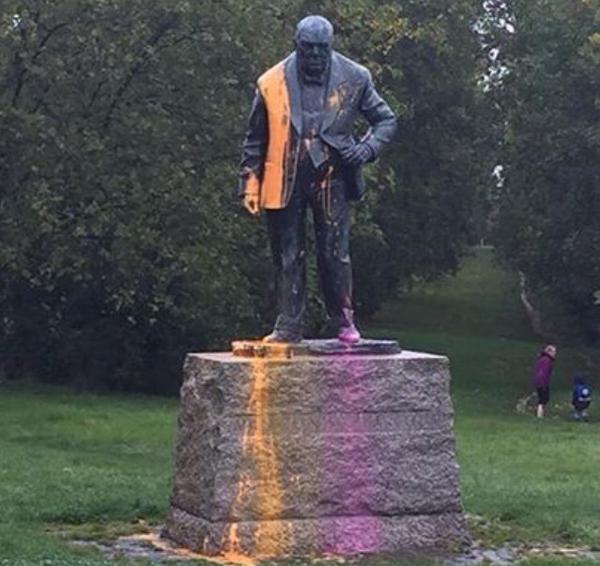
Not, unfortunately, as good as this, from Mayday 2000:
” One of the best incidents at an RTS event was, famously, the punk makeover of the genocidal Winston Churchill (May 2000), his statue graffitied, which was later made into a great sticker under which was written: “THIS WAS HIS FINEST HOUR”. One of his lesser known contributions to being “Britain’s greatest Prime Minister” (Ken Livingdeath) was his deliberate mass starvation of the Bengalis during World War II. When Churchill requisitioned the Bengalis boats, essential for the distribution of rice, Earl Mountbatten made arrangements for 10% of the space on his battleships to be put aside for rice distribution. Churchill promptly withdrew 10% of Mountbatten’s battleships. 3 million died. “They’ll reproduce themselves soon enough”, Churchill was meant to have said. With the possibility of 3 billion or more dying in the future apocalypse, today’s Malthusians hope the reproduction process will be far slower. When W.C. (who as Home Secretary before World War I had ordered the killing of Tonypandy striking miners) died in 1965, his death was celebrated throughout South Wales.”- From here
…Manchester: squat for homeless opened in city centre office block
China: report showing big increase in strikes and worker protests in third quarter of the year
5/10/15:
Iraqi Kurdistan: teachers strike against unpaid salaries shuts down streets
France, Paris: threat of jobcuts provokes role-reversal at Air France – now it’s the workers who have the shirts off the backs of the managers “…two high-level managers fled, one bare-chested and the other with his shirt and suit jacket shredded. Road access to Charles de Gaulle airport in Paris was briefly disrupted, and some flights suffered delays. ” More here “Two security guards, one of whom was knocked out and did not recover consciousness for several hours, were hurt in the fracas” . Video here in French of air hostess participating in sequestration of top managers, trying to have a dialogue with the deaf, dumb and blind. Graphic video here in Portuguese (not necessary to understand the language).
Unions dissociate themselves from the workers’ anger Translated from the French:
“The co-managers of the labour force dissociate themselves (as usual) from the workers’ anger.
CGT: Air France CGT has expressed its willingness to “calm things down” after the excesses in CCE. “We did not want CCE to be invaded,” Mehdi Kemoune, deputy general secretary of the union told AFP {some media organisation]. He claimed to have intervened to protect HRD Xavier Broseta, target of the protesters, which led him also to be too j0stled. According to him, the CGT had “warned” the directors that the situation could escalate, calling them to strengthen security.
(AFP, 05/10/2015 at 16:48)
CFDT: “The CFDT unreservedly condemns with the utmost firmness the outrageous violence against representatives of the management that occurred this morning at the Central Committee of Air France.”
(Press Release No. 46 of the Executive Directorate of the CFDT, October 5, 2015)
“I never imagined that it would go this far. It is unworthy of such employees, but I know that it is isolated individuals.”
Beatrice Lestic General Secretary CFDT Air France
(France TV Info, 05.10.2015 | 10:02 p.m.)
SNPL: the SNPL of Air France ALPA, the main pilots’ union, also “condemned the excesses against the leaders of the company, and the violent repression of the demonstration of quiet and serene employees”.
GSC: “It’s a real shame, I am stunned by what just happened,” joked Ronald Noirot, manager of the CFE-CGC, CEC member, contacted by FranceTV info. “In thirty-five years spent at Air France, I have never seen it. We witnessed something very serious. The protesters were white-hot, like utter beasts”.
(France TV Info, 05.10.2015 | 10:02 p.m.)
UNSA: “UNSA strongly condemns the aggression of HRD Air France’s Directors. Physical violence against persons is not syndicalism.”
(UNSA Airlines Co. on Twitter, 1:52 p.m. – October 5, 2015)
“It was really hot, there was a lot of noise and an enormous amount of people. It quickly turned into anarchy.”
Jean-Pierre Bernasse, member of UNSA Air France
A little rabble: hooligans and stupid people
Manuel Valls called for “severe sanctions” against the perpetrators of the “intolerable acts” during a visit to the company headquarters in Roissy (Val-d’Oise). “These acts are the work of thugs,” said the Prime Minister.
(francetvinfo, 06.10.2015 | 10:53)
On Monday the violence against members of the management of Air France were the work of “stupid” but “isolated people”, said the Minister of Economy, Emmanuel Macron, on Thursday in an interview with CNN. “We are talking about a few isolated, extremely violent people, who decided to do that after the announcement of a major restructuring plan,” said Emmanuel Macron.
(BFMTV, 08.10.2015 at 11:14 p.m.)”
Nicaragua, North-West: goldmine blockaded “Attempts at peaceful solutions have not been successful so far and the operation, community and majority of workers are now exposed to the consequence of aggressive illegal action imposed by a small number of individuals. The company continues to work with the government and the two unions, who want to return to work immediately, to affect a rapid resolution of this illegal blockade”
US, Chicago: high school students walk out over miseducation cuts (video here)…Alaska: prison riot “A Lemon Creek Correctional Center dorm has been left uninhabitable and all inmate visitations have been stopped after a prison riot Monday night. According to sources within the prison, the incident was sparked by an unexpected source: phone service….The riot has exposed inmates’ agitation over a phone system that charges them far more than typical rates, then returns some of the revenue to the Department of Corrections. “This is clearly so somebody just can get rich,”… For three calls totaling 28 minutes of talk with one inmate at Lemon Creek, the Empire was charged $3.51. If the newspaper pays by credit card, the bill will rise to $10.46, or 37 cents per minute. That’s more expensive than calling a landline phone in South Africa from Juneau with AT&T. In public documents, Securus stated that the fees are necessary for it to earn a profit… To talk for more than 20 seconds, the person receiving a call must register with Securus, handing over name, address, email and telephone number to a permitted database. It’s a confusing process that took the Empire 20 minutes to accomplish. Inmates can’t leave voicemail messages, dial for an operator or directory assistance or use 1-800 numbers. They can’t do three-way calls or use services like Vonage or Google Phone to get around the cost of long-distance calls. All calls are monitored, and the prison or Securus can end them at any time. One such call to the Empire was abruptly stopped with a message: “This call is being terminated — no third-party calls are allowed.” For that 16-second conversation, the Empire was charged $1.17….“In reality, the long-distance rate quadrupled,”…The phone system wasn’t the only source of contention, of course. There were other contributing factors before Monday’s riot, sources said, including a “phase program” that allowed inmates to earn rights and privileges previously granted for free….The spark into violence, however, does appear to have come from the latest development with the phone system. Sometime between 9 p.m. and 10 p.m. Monday, calls were abruptly stopped, and inmates became agitated by the fact that they would be paying for those disrupted calls…. In E dorm (also called E-mod), inmates gathered and organized. They may have attempted to lure the corrections officer into the dorm from for an ambush, but inmates deny this. About 11:15 p.m., an inmate wrapped a towel with eyeholes in it around his face. Events escalated as inmates covered E-dorm’s cameras and uprooted a table bolted to the dorm’s concrete floor. The table was wedged against the door into the dorm, and a window into the dorm was broken. Bathroom partitions and bunk mattresses were ripped from their places and shoved against the broken window in an unsuccessful attempt to prevent corrections officers from flooding the dorm with pepper spray through the resulting hole.”
4/10/15:
France, Arles: 30 youths ambush cops, burn cop car; 2 cops injured; bins set alight
Eire, Dublin: 2nd day of showhouse occupation by homeless
3/10/15:
Canada, Toronto: festive crowd attacks cops
France, Cannes: some looting during & after storm Pi writes: “Authorities seem outraged that some proletarians (who else could it be?) looted shops during floods (they targeted the cheap Lidl supermarket, which indicates they went for pretty basic needs this time) ; they sent the CRS to some areas, probably fearing that some expropriations would take place in some of the many luxury shops of Cannes’ center (which also happens when there are no floods, of course, especially in a region where the most contemptuous wealth stands alongside the same misery as elsewhere).” SamFanto writes: this report implies that it was the floods that smashed the windows or doors of shops, so it might just be that Lidl was looted because the flood had given people access to it. It should also be pointed out that there was unpleasant anti-proletarian looting of caravans damaged by the flood….France, Nantes: criminologist adviser to prime minister and formerly to Sarkozy put in custardy “… a regular of TV chatshows: Alain Bauer. After spending his youth in the UNEF and the Socialist Party, he is employed by a company linked to US intelligence services. This criminologist, an influential advisor successively to Michel Rocard, Nicolas Sarkozy, and finally to Manuel Valls – his friend for 30 years, Bauer is the godfather of the son of Valls – …has worked for 30 years importing Anglo-Saxon police doctrines to France, and promoting strategies against insurgency taken from the war in Algeria. As such, he is at the origin of the anti-terrorist Tarnac masquerade and initiator of police fantasies against the “anarcho-autonomous” movement. If surveillance is now complete, if repression is becoming militarised, if dozens of people lose their eyes or life because of the police, we owe it especially to Alain Bauer. For all of his work, this particularly malevolent mustachioed media-madman received two pies ….” Hardly his just desserts – but a starter.
UK, London: typical mental Met mentality
Brazil, Recife: occupy demonstrators hurl rubbish at cops after cop fires rubber bullet at point-blank range My immediate response to this was that the media, under the guise of outrage, were in fact trying to convey how unlethal and relatively harmless rubber bullets are, as the photo implies. At the same time, showing how liberal the state is – by suspending the cop who fired it. In fact, rubber bullets can kill and certainly often shatter bones beyond repair. See, for example, this.
2/10/15:
Mexico City
…Oaxaca: shops, banks etc. attacked on commemorative demo for the ’68 massacre in Mexico City “…vandalism, including graffiti on various commercial establishments, government offices and historical monuments of the city, and mischief causing damage to two car dealerships; as well as windows…established businesses, banks, homes and vehicles….the Attorney General of the State of Oaxaca was informed of various events in which workers participating in the education service in the state of Oaxaca seized some vehicles of various private companies and some from the State Government”
Italy, Bologna: in movement against state miseducation reforms students scuffle with cops
1/10/15:
France, Loire: National Front tour attacked…Lot-et-Garonne: prisoner escapes from sports complex during boxing tournament (his 2nd escape)
Honduras, Tegucigalpa: as students go on strike, tourism vehicle and cop car are attacked, roads blocked “…the protest was in solidarity with the evicted peasants in Choluteca and the north where a young man died. …also …a demand for democratisation and an end to exclusion and repression by the authorities, and the prohibition of the entry of certain organizations wanting to dialogue with students.”
India, Calcutta: left-wing activists and others clash with cops over cop atrocities “The police, along with officials of the Rapid Action Force, lathicharged protesters at Ganesh Chandra Avenue when they broke two of the three barricades. The protestors were seen throwing rotten eggs towards the police barricade. A few mediapersons also received injuries during the clash. “More than 200 of our supporters have been injured today during the lathicharge.”



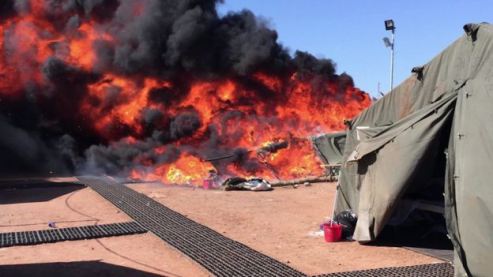

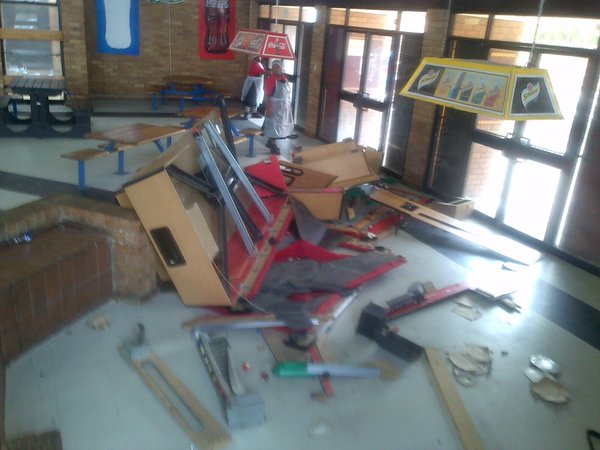
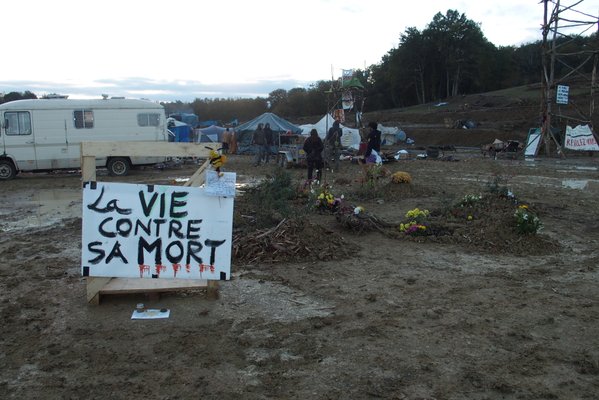
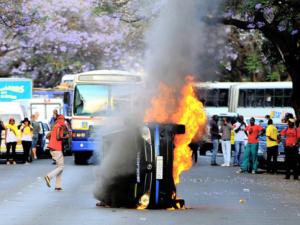
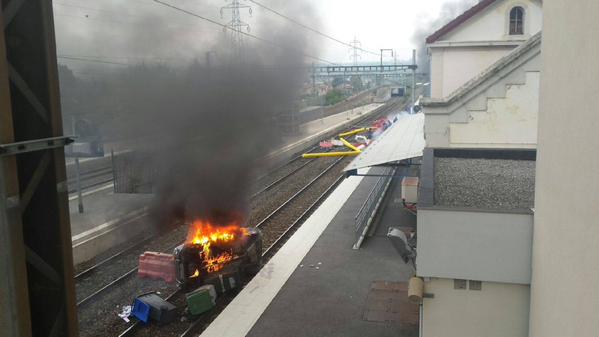
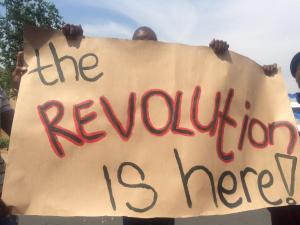
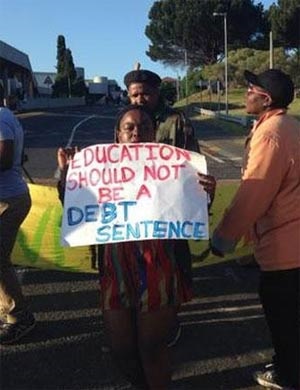
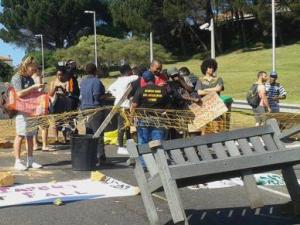
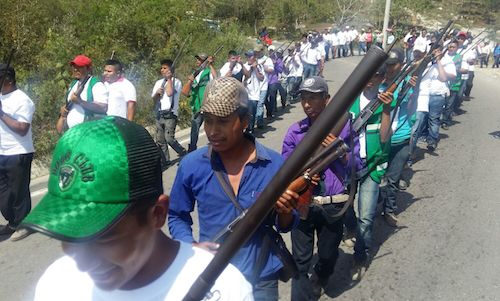
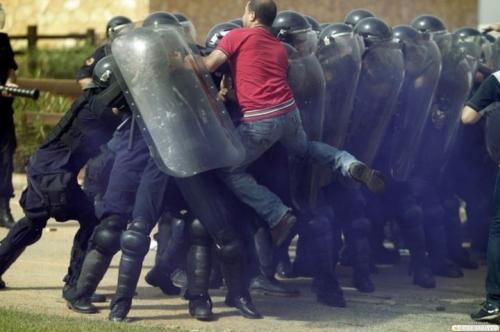

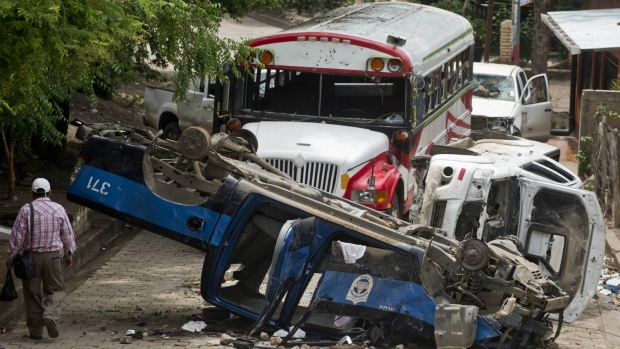
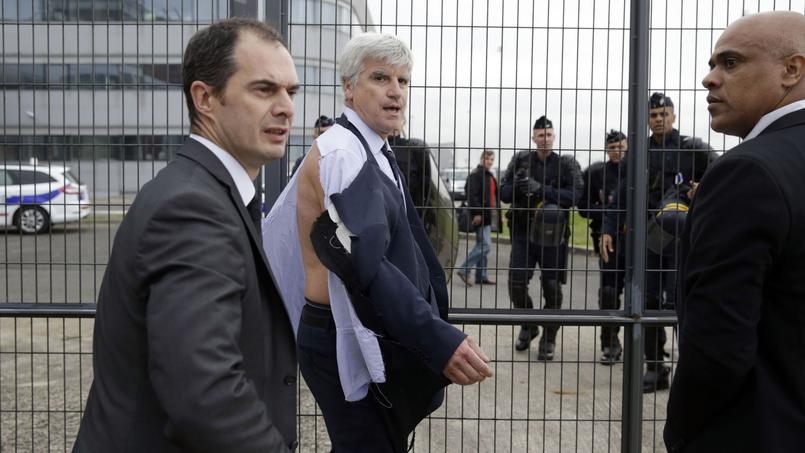
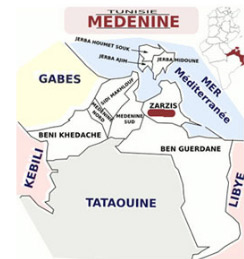
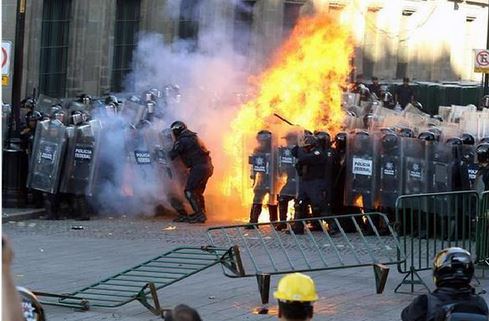
Leave a Reply